
How Psychiatrists Can Make Use of Local SEO to Improve Their Website Visibility
Sadly, a psychology degree is not enough to gain trust anymore. You need to work on SEO and word of mouth to get your clinic booming.
Since 68% of all online experiences begin with a search and 86% of people ignore banner ads, Google rankings are your sure-shot way to target local visitors.
12 Local SEO Tips for Psychiatrists
1. Find Accurate Keywords to Match Search Intent
You must find keywords to match the search intent. Search intent is classified into two categories: Buying Intent and Research Intent. Buying Intent includes keywords like 'psychiatrist near me’, where a searcher is actively looking to book an appointment.
Research intent has keywords like, 'how much does a therapy session cost', where the searcher is researching and is not ready to buy. An article titled ‘the importance of a psychiatrist in your life’ shouldn't rank for 'psychiatrist cost'.
Tools to Help You Find the Right Keywords:
- Google Trends: Filter the location for your town or city and see which keywords are trending. Use 'related queries' to find long-tail keywords. The below screenshot shows the keywords for the Delaware location.

- Ahrefs: Ahrefs Keyword Explorer has interesting filters to find the most relevant keywords to match the search intent.
- Google Ads: Google Ads has an exact' filter that provides keywords close to particular search intent. Search for seed keywords on Adwords and refine them with filters.
2. Improve User Experience on Your Website
Google algorithm has always preferred websites with better UX. You must focus on creating content that visitors enjoy.
User experience and SEO work together to increase conversions for your website, whether website content or copy, design, and color provide a great user experience.
How to Improve UX on Your Website?
- Improve Page Speed: Users form an opinion about your website in 0.05 seconds. Moreover, they leave if the load time goes from 1 to 3 seconds.
The screenshot below shows that a psychiatrist's site has a loading speed of almost 4sec, which annoys the users and makes them bounce.

- Create Interactive Website: UX design gives you a massive advantage over competitors as bad design decreases user interest by 50%.
- Optimize for Mobile: Think With Google suggests that 60% of smartphone users placed a direct call from a website that appeared in SERP. Optimizing your website for mobiles promises excellent ROI on your SEO efforts as you get direct benefits from ranking.
Read: How to Use UX Design to Improve Your SEO
3. Build Citations
Citations are linked or unlinked mentions of your clinic, including your address, phone number, and website. Local citations are similar to a business directory; they increase your credibility among local patients.
The below image shows how a citation appears in the directory to help the users.
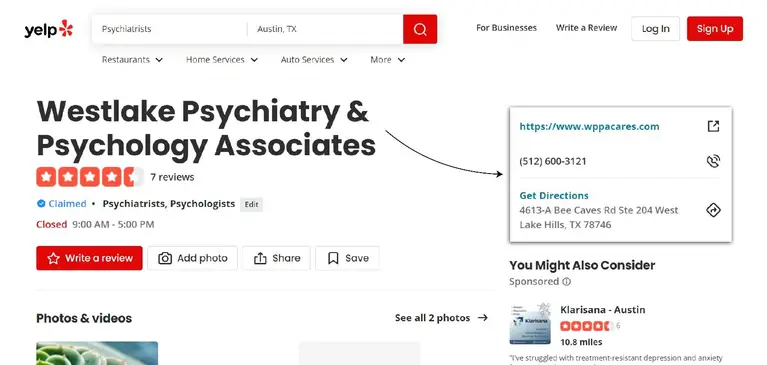
A structured citation is a website containing the necessary details of your clinic in a structured manner, beside or under a blog. Still, it's an unstructured citation if the writer mentions you in a blog with some information.
Tools to Build Local Citations:
- Whitespark: Whitespark contains a list of citations you can filter by country.
- Foursquare: Foursquare is a data aggregator collecting business information from various search engines like Google and spreads them to other sites.
- Local Directories: List your clinic on local directories so searchers can instantly book an appointment. Before listing, check if the directory already has your listing as they pick businesses from data aggregators.
4. Gather Positive Reviews
Positive reviews are pretty significant in the healthcare sector. NRC Health surveyed various patients; 59.9% considered online reviews necessary for a personal recommendation.
Patients are skeptical about doctors' online reputations; a personal brand or truckload of positive reviews are symbols of trust for patients. Patients look for a 7-star rating out of 10 to consider visiting a doctor.
Take a look at the below screenshot. Would you visit this psychiatrist after witnessing these reviews?
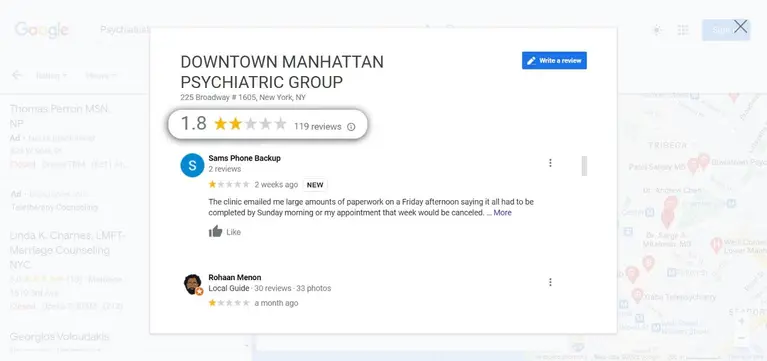
Tips to Make the Most of Reviews
- Don't Shy Away from Asking: People often skip reviewing; politely ask your patients' families to review your service if you want to increase your website reviews. It helps if you wait till recovery when they trust you more.
- Keep the Negative Reviews: Website visitors want a balanced perspective; negative reviews are equally valuable for them as all positive reviews raise suspicion.
- Pay Attention to Complaints: Patients pay extra attention to what you do with reviews. Create a section for complaints/suggestions and implement them in your practice to gain trust.
5. Analyze Your Results
Converting visitors to customers is not the only purpose of your websites. Visitors go through a buyer's journey, and each section of your website plays a role.
Use tools to analyze how visitors interact with your website, where they click the most, and how many of them book a call. Several free and paid tools help you track a website's performance.
Tools to Analyze Results:
- Google Analytics: Analytics is a free tool by Google to help you track your website performance. It lets you discover the number of visitors per page, their time on your site, traffic sources, top content, and conversions. The below screenshot shows an overview of user acquisition.

- Crazy Egg: Crazy egg is a click mapping tool that tracks where visitors click the most or how far down they scroll. You get an idea of which sections on your site are gathering the most attention.
- SEOmoz: SEOmoz audits your website for SEO. It analyzes your link strength and relevance and how you rank for various keywords.
6. Create Educational Content
As a psychiatrist, educating your audience is crucial. Mental health is a great niche to blog due to lesser knowledge among the masses.
Social media trends make them even more popular; reels by psychiatrists educating the audience about mental health gather great response. Create educational content to build authority among your target audience.
Tips to Create and Rank Education Content
- Blogging as a Psychiatrist: As per HubSpot, businesses that create blogs generate 67% more leads than those that don't. Blogs set you apart from other psychiatrists who only share information in clinics and not for free on the web.
- Include FAQs: Clear and concise FAQs help answer burning questions in your niche and increase your rankings. Use FAQ schema to create a list of questions and answers related to a topic. This enhances the chances of appearing on your page in the PPA section.
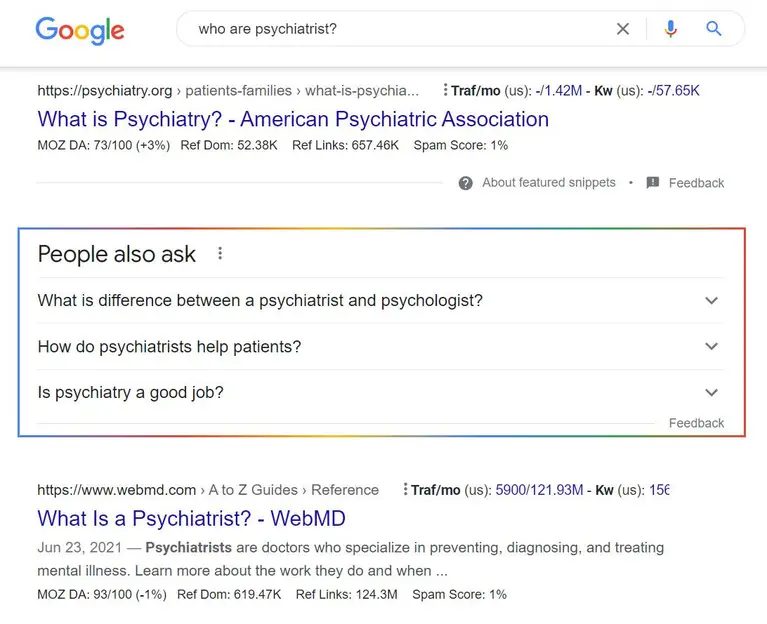
- Newsjack: Newsjacking means creating content based on something already in trend. For instance, you can review a popular movie focusing on mental health and provide some expert insights.
7. Google My Business
Google My Business is a free platform to add your business, photos, and offers. It contains essential information about your business like operating hours, phone number, and safety measures to give a heads up to visitors.
How to Make the Most of Google My Business?
- Add NAP: Add the correct name, address, and phone number, consistent with the information you provide in communities. Ensure it’s the same as on all other business citations, and pin your location precisely on maps to help the audience walk in without confusion.
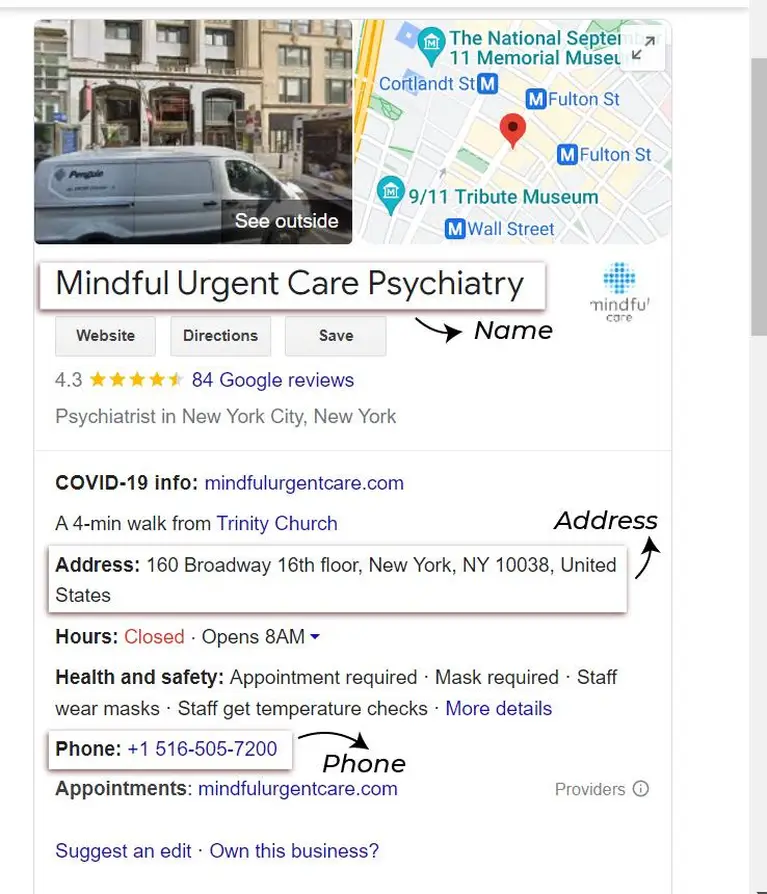
- Add USPs Under Authentications: As a psychiatrist, you can add that your clinic is sanitized daily for maximum hygiene or sell books for mental health patients. USPs set you apart.
- Verify Your Account: Google sends emails and text messages to verify your account to ensure you're the rightful owner of your business.
Read: Step-by-step Setup Guide for Google My Business Set up
8. Build a Personal Brand on Social Media
The personal brand establishes you as an expert and drives massive traffic to your business. Create valuable content on at least two social media channels to establish your expertise, preferably Instagram and LinkedIn.
Post links whenever you post a new blog or add an update to your service. Share recovery stories to build connections and trust among viewers.
Tips to Use Social Media Marketing as a Psychiatrist
- Using Local Hashtags: Hashtags play a crucial role in spreading your content to your target audience. Use tools like Inflact to find local hashtags in your niche, so your content reaches the right people.
Take a look at the below screenshot to see how well it provides the hashtags with their usage metrics.

- Engaging with Locals: Engagement is crucial in social media marketing. Engage with people in DMs, set up story polls and question stickers, and reply to comments on your posts.
- Community Building: Social media is about building a community. People in a close-knit community are more likely to convert than mere followers. Build groups and conduct free sessions to form communities.
9. Build Relevant Links
A study by Backlinko found a solid correlation between the number of backlinks and higher rankings on Google. Aim for backlinks from websites with high domain authority to reap maximum benefits.
Long-form content gets more backlinks than short-form content, focusing more on writing elaborate blogs and case studies of at least 1000 words.
Tools to Help you Get Quality Backlinks
- Hunter.io: Hunter.io pulls out emails of various employees in a company. So, if you want a link from a company website, find emails via Hunter to pitch them for it.
As shown in the below image, enter the company’s name, and it will show the email IDs of the employees.
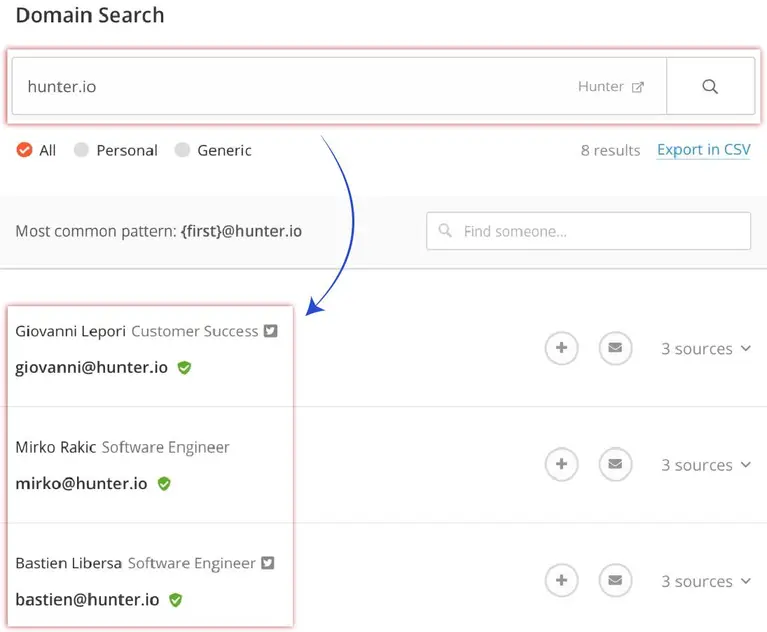
- Ahrefs' Link Intersect: Link Intersect tool in Ahrefs lets you find websites that link back to your competitors but not you. You can pitch those sites to link back to you.
- SEO Spyglass: Spyglass monitors your backlinks to find harmful links that can cause a penalty by Google.
Read: Best Practices to Earn High-Authority Backlinks for Your Website
10. Optimize your Website for Local SEO
SEO entails complex processes and hours of research every day. But optimizing your website for local SEO increases the visibility of your website, thus, increasing business opportunities.
As per SEO Expert's research, 92% of local searches would choose a business that pops up on the first page. That's why targeting local SEO for your psychiatric clinic is important.
How to Perform Local Search Engine Optimization?
- Using Local Keywords: Use local keywords in your blogs and website content to rank on the first page.
- Competitor Gap Analysis: Competitor Gap Analysis helps you stay ahead of the competition. Analyze their content topics, targeted keywords, and backlinks to fill gaps in your website.
Look at the screenshot below, which shows the number of opportunities a site is missing to rank.
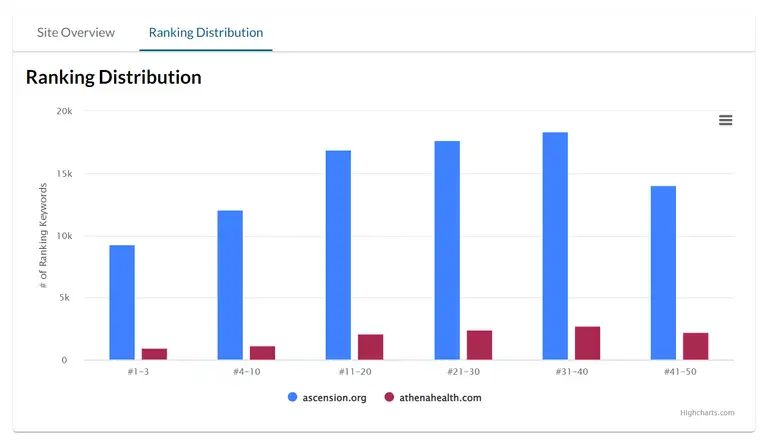
- Backlinks from Local New sites: Local news stations are trustworthy among the public. Pitch them to link back to your site or write guest blogs for them.
11. Optimize for Voice Search
As devices like Alexa become common, more and more people use voice to do searches. Optimizing your site for voice is different from the text, as voice searches are longer.
For instance, if someone is looking for a psychiatrist, they would type, "psychiatrist near me", but with a voice search, he would say, "suggest a good psychiatrist near me".
Tips to Optimize for Voice Search:
- Use long-tail keywords: Since voice searches are longer, use long-tail keywords to grab SERP's attention. Think about how you ask questions and target similar keywords.
Take a look at the screenshot below Google search box gives plenty of “autocomplete suggestions” that audiences are using to search. These keywords can be included in your site to optimize for voice search.
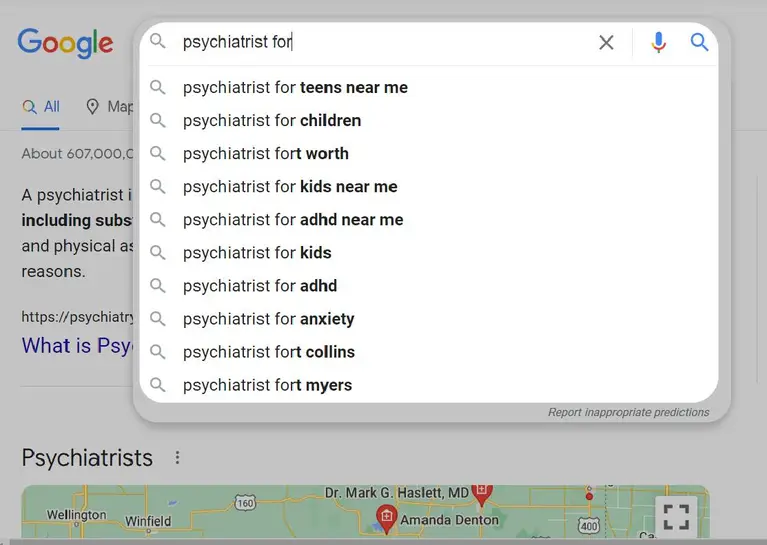
- Create FAQ Pages: Since the voice is focused on questions, create specific FAQs and provide answers in the FAQ schema to further rank for long-tail keywords.
- Create Scannable Content: Scannable content is easy to analyze and can also strike a chord with voice searches since they include short sentences.
12. Improve EAT
A document launched by Google to provide a sneak-peek into its algorithm mentioned the importance of quality content, and Google considers three essential factors while ranking a website.
What's EAT?
- Expertise: Google likes content that showcases your expertise. It examines industry forums and discussions to see if you know what you're talking about.
- Authoritativeness: Authoritative websites consistently rank better. Testimonials and reviews help showcase your authority as a psychiatrist, so wear them like a badge of honor.
- Trustworthiness: Incorrect information hampers your rankings. Make sure you're linking to trustworthy websites like news or government sites.
Read: Importance of E-A-T for your eCommerce Site & How it Influences your SEO?
Local SEO for Psychiatrists - FAQs
1. How do Local SEO help Psychiatrists?
People trust organic results more than paid ads. Local SEO optimization provides visibility to your clinic and helps you rank on top for local searches.
2. What are the best local SEO practices for Psychiatrists?
- Creating Educational Content
- Building a Personal Brand
- Building Backlinks and Citations
- Optimizing your website for SEO
- Adding clinic to Google My Business
3. What Tools help in Local SEO?
- Ahref's Link Intersect: To find links
- FAQ Schema: To add FAQs
- Google Analytics: To analyze your website's performance
- Google Trends: To keep track of the latest trends
- Google Adwords: To find search intent
4. Are citations important for SEO?
Citations are crucial for local SEO. They:
- Contain your name, address, and phone number
- Lead to increased website authority
- Improve ranking
Key Takeaways
- Optimize your website for local SEO by targeting local keywords.
- Use tools like Ahref's Link Intersect and Spyglass to build and manage your backlinks.
- Optimize your website for voice search by targeting long-tail keywords and adding FAQs.
- Build your brands on social media to gain the attention of a local audience. Use local hashtags, so your content reaches people in your city.
- Create educational blogs about mental health, wellness, and other topics relevant to your target audience.
- Find accurate keywords matching the search intent of your target audience.
ABOUT THE AUTHOR:
Brice Decker

Brice has been handling marketing projects for more than 12 years and he is providing consulting services on SEO, Social Media and PPC. He has a huge expertise in working at large corporations including Accenture Interactive & PwC Digital Services.
ABOUT THE AUTHOR:
Brice Decker

Brice has been handling marketing projects for more than 12 years and he is providing consulting services on SEO, Social Media and PPC. He has a huge expertise in working at large corporations including Accenture Interactive & PwC Digital Services.
Related Post
How to Rebrand Your Business Without Losing SEO?